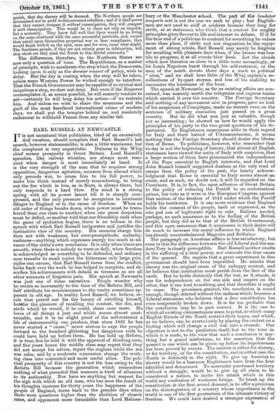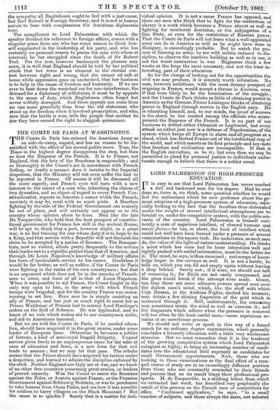EARL RUSSELL AT NEWCASTLE.
IT is not unnatural that politicians, tired of an excessively dull vacation, should complain that Earl Russell's last speech, however statesmanlike, is also a little wearisome, but the complaint is very unpatriotic. Dulness in the Whig chief means prosperity in Great Britain. Lord Russell's speeches, like railway whistles, are always most reso- nant when danger is most immediately at hand. It is the very strength of the man that he requires strong opposition, dangerous agitation, menaces from abroad which only precede war, to rouse him to his full power, to make him think instead of merely remembering, to bring out the fire which in him, as in flints, is always there, but only responds to a hard blow. His mind is a strong spring with all its power latent till it is sharply com- pressed, and the only pressure he recognizes is imminent danger to England or to the cause of freedom. When an old order of things breaks down, when power must be trans- ferred from one class to another, when one great despotism must be defied, or another told that our friendship ends when the game of spoliation begins, there is no tedium in the speech with which Earl Russell invigorates and justifies the instinctive view of the country. His enemies charge him then not with weakness, but over-promptitude, audacity, rashness—anything which expresses energy too much in ad- vance of the critic's own conclusion. It is only when times are smooth, when there is nobody to warn or defy, when freedom is acknowledged as something to be defended, and ordinary men transfer to small topics the bitterness only large prin- ciples can excuse, that Earl Russell turns from the conflict, looks back over the work he has helped to complete, and de- scribes his achievements with details as tiresome as are all other accounts of forgotten pain. His speech at Newcastle was just one of these narratives. People wonder why he recurs so incessantly to the time of the Reform Bill, and half attribute his reminiscences to the vanity sometimes ap- parent in old age. In reality Lord Russell, we believe, re- cals that period not for the luxury of extolling himself, bubifor the pleasure of recalling the contest, the din, and strife which he would, if he could, share once more. He loves of all things a just end which seems almost unat- tainable, and it is no slight proof of the self-restraint a life of statesmanship can produce, that since 1831 he has never started a " cause," never striven to urge the people forward to the hundred glittering but dangerous ends he could have held up before them. He has held up Reform, it is true, but he held it with the approval of thinking men, and five years hence the middle class may regret that they did not accept his advice, repair the engines while the sea was calm, and by a moderate concession change the work- ing class into contented and most useful allies. The poli- tical prosperity of this country is not the less owing to the Reform Bill because the generation which remembers nothing of what preceded that measure is tired of allusions to its authorship. Nor have we anything but respect for the sigh with which an old man, who has seen the result of his thoughts increase for thirty years the happiness of the people of England, turns back to the grander days when there were questions higher than the abolition of church rates, and opponents more formidable than Lord Malmes- bury or the Manchester school. The part of the laudator temporis acti is not the one we seek to play ; but English- men are not used to sniff at soldiers because they long for strife, or at statesmen who think that a contest for mighty principles gives flavour to life and interest to debate. If it be the true end of a politician to contend for something he values more than place, if strife and not stagnation be the enjoy- ment of strong minds, Earl Russell may surely be forgiven for recalling with pleasure days when, if the breeze was hos- tile to progress, it at all events blew fresh. Let the clouds which now threaten us close in a little more menacingly, or let Louis Napoleon burst through his self-restraint, or the men of the north devote three days a week to political " cries," and we shall hear little of the Whig captain's re- collections of by-past storms, and less of his inability to encounter the hurricane of the hour.
The speech at Newcastle, as far as existing affairs are con- cerned, was scarcely worth the telegrams and express trains which carried it over the country. The Foreign Secretary said nothing of any movement now in progress, gave no hint of his suspicions of Compiegne, made no remark even on the sentence of military execution just passed On a great country. But he did what was just as valuable, though not so interesting ; he showed us how he would apply the principles of his party to the two great questions of his de- partment. To Englishmen unanimous alike in their regard for Italy and their hatred of Ultramontanism, it seems nothing that the Foreign Secretary should desire the libera- tion of Rome. To politicians, however, who remember that to-day is not the beginning of history, that almost all English statesmen have viewed the unity of Italy with suspicion, that a large section of them have pronounced the independence of the Pope essential to English interests, and that Lord John Russell himself suggested dualism as the only road of escape from the policy of the past, the hearty acknow- ledgment that Rome is essential to Italy seems almost an event, and as such, we doubt not, it will be regarded on the Continent. It is, in fact, the open adhesion of Great Britain to the policy of reducing the Pontiff to an ecclesiastical prince, her vote as it were in the European Congress against that section of the treaties of 1815 under which the Pontiff holds his territories. It is one more evidence that England holds the consent of the people, tacit or expressed, as the sine qud non of legitimate right to rule. Italians needed, perhaps, no such assurance as to the feeling of the British people, but they did as to that of the British Government, and this open assurance that it acquiesces in their desire will do much to increase the moral influence by which England has already counterbalanced Magenta and Solferino. The paragraph on American affairs is less satisfactory, but even in this the difference between the old Liberal and the mo- dern Tory is clearly perceptible. Earl Russell neither exults in the suffering of a rival power, nor conceals the true cause of the quarrel. He regrets that a great experiment in free government should have been imperilled. He admits that slavery was the original cause of the unhappy contest, and he believes that institution must perish from the face of the earth. But he holds distinctly that the war, as it stands, is one for independence on the one side and empire on the other, that it can lead to nothing, and that therefore it ought to cease. The premisses granted, the conclusion is sound enough, though uttered without the sadness which becomes a Liberal statesman who believes that a free constitution has even temporarily broken down. It is far too probable that the conclusion may be in part correct. It is the one to which all existing circumstances seem to point, to which many English friends of the North restrict their hopes, and which, as we believe, can be averted only by placing the contest on a footing which will change a civil war into a crusade. Our objection is not to the prediction itself, but to the tone in which it is made, to the view that such a conclusion is any- thing but a grand misfortune, to the assertion that the quarrel is one which can be given up before its hopelessness has been proved by events. The contest is either for slavery, or for territory, or for the constitution, and in either case the North is distinctly in the right. To give up America to slavery would be a baseness Englishmen have from the first admitted and denounced. To surrender purchased territory without a struggle, would be to give up all claim to be considered a nation, to invite the attack which in this world any confession of weakness brings. To break up the constitution at the first armed demand, is to offer a premium on the disintegration of a country whose importance in the world is one of the first guarantees of the ultimate victory of freedom. We could have desired a stronger expression of the sympathy all Englishmen ought to feel with a just cause, but Earl Russell is Foreign Secretary, and it is not in human nature to bear with complacence the American diplomatic tone.
The compliment to Lord Palmerston with which the speaker finished his reference to foreign affairs, comes with a singular grace from one who has some reason to think him- self supplanted in the leadership of his party, and who has certainly no personal reason to praise the man with whom at intervals he has struggled since the death of Sir Robert Peel. For the rest, however hackneyed the phrases may seem, it is well that England should be told by her political chiefs that her force is an element in the eternal con- test between right and wrong, that she cannot sit safe at home while oppression goes on unchecked, that her business is to help in the cause of freedom and humanity. If we are ever to beat down the wretched cry for non-interference, the demand for a diplomacy of selfishness, it must be by appeals to the sense of duty, which Englishmen often forget but never wilfully disregard. And these appeals can come from no one more gracefully than from the old statesman who stood up for freedom when it involved proscription, and who, now that the battle is won, tells the people that neither he O'er they have earned the right to sluggish quiescence.































 Previous page
Previous page